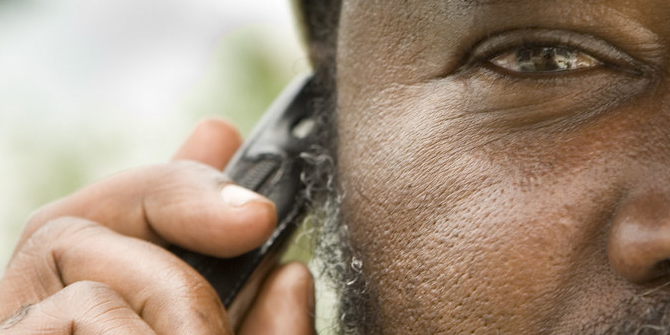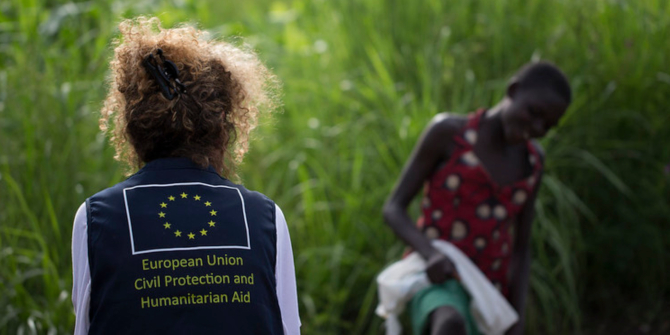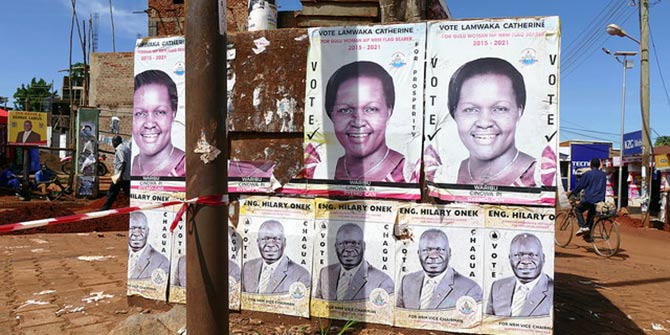Following the twenty-year war with the Lord’s Resistance Army, the Ugandan government formally committed to addressing widespread human rights violations and war crimes committed during the conflict. Anna Macdonald writes that the gap between committing to transitional justice and its implementation impacts the relationship between the conflict’s victims and the state, and the policy’s international donors should bear responsibility for the effect on democratic governance.
This post is part of our #LSEReturn series, exploring themes around displacement and return.
Last month, to little fanfare, a Ugandan government spokesperson informed a group of journalists that the Cabinet had approved the long-awaited National Transitional Justice Policy. The announcement was made at a regular press briefing, among other statements relating to recent flooding in Kampala and controversy over police comments that a plane chartered by the Central Bank was found carrying illegally printed money.
Not on social media myself, I stalked around on Twitter and found very little mention of the transitional justice (TJ) announcement. A couple of Ugandan news outlets covered the story briefly and civil society groups working on the policy had issued a short statement. In some ways the lack of attention is surprising because, in the mid-2000s, Uganda was the transitional justice case study.
Peace talks to end the twenty-year war between the Lord’s Resistance Army (LRA) and the Ugandan government had begun in Juba, southern Sudan in 2006. Quite notably, they were taking place against the backdrop of the International Criminal Court’s historical first arrest warrants, issued against five LRA commanders, including its leader Joseph Kony. The warrants made the peace process complicated, and sat uneasily with domestic amnesty legislation, which was popular in the north and offered amnesty to any fighter willing to renounce rebellion and give up their weapons.
Justice then, had to be dealt with at Juba. In June 2007, ceding to international and domestic pressure and seduced by the reputational gains and donor funds on offer, the Ugandan government and the Lord’s Resistance Army signed an Agreement on Accountability and Reconciliation (AAR) and then, the following year, an implementing annex. The AAR accords were presented as a way out of the International Criminal Court’s impasse. They proposed a national transitional justice framework to address widespread human rights violations and war crimes committed during the conflict.
Ultimately the peace talks failed, but the Ugandan government still committed to implementing a National Transitional Justice Policy and international donors were quick to fund this process and lend rhetorical weight to its potential to build peace and strengthen democratic governance. Over ten years later, despite lots of donor funding and campaigning by civil society groups, very little progress had been made. So what happened?
“Somehow, this process has become so artificial.”
In a new article published in the International Journal of Transitional Justice, I argue that what emerged in Uganda is the euphemistically termed ‘implementation gap’. This has been defined by Roger Duthie of the International Centre for Transitional Justice as a situation whereby ‘measures to address past human rights are proposed and even designed but go unimplemented or only partially implemented’. The previous UN Special Rapporteur on the promotion of truth, justice, reparation and guarantees of non-recurrence identified this as a problem of ‘scandalous proportions’, not just in Uganda but across the globe. In the article I argue that rather than a temporary bump in the road the implementation gap is a dynamic, enduring political space generated, constituted and sustained by the interaction of technocratic donor approaches towards transitional justice, and the power imperative of domestic elites in nontransitioning places.
As seen in other contexts on the continent, including Burundi, Democratic Republic of Congo, Kenya and Cote d’Ivoire, transitional justice will rarely be either rejected or embraced, and rather it is managed. In Uganda, the executive came under increasing pressure from donors to make headway on the National Transitional Justice Policy. In 2018 the EU committed 66 million euros to justice sector reform in which TJ is an important area. Other justice sector donors, who had been funding the process for years were becoming increasingly frustrated. The announcement that the Cabinet has approved the policy is therefore not so surprising. But there is still a long way to go which might explain why reaction to the announcement has been muted. As reported in Uganda’s The Independent, a huge number of bills are proposed to go before parliament in 2019: 72 in total, of which 23 were supposed to have been delivered in the previous session. Unless the policy is marked as a priority (unlikely), it may well fail to see the light of day in 2019.
More importantly, if and when the policy does pass into law, its content will depart from what was originally proposed in the AAR accords, and will be much more palatable for the government. The policy approved by the Cabinet contains watered down proposals on the various TJ mechanisms. The fate of a truth ‘body’ as proposed in the AAR implementing annex, with a mandate to ‘inquire into the past and related matters’, is instructive. It has seemingly been replaced by vague reference to ‘truth-telling mechanisms’ which can contribute to ‘reconciliation and nation-building’. This, donors explained to me, allowed the Ugandan government to ‘control’ the process, rather than risk ‘losing the narrative’ about the history of the conflict. One donor acknowledged that this was now non-negotiable; a national process could only proceed if the policy ‘steers clear of things that are politically sensitive, like accountability … it can’t have anything where you are directly implicating the government’s role.’
This is a major problem for affected communities in northern Uganda, where there has always been a strong desire for state accountability. A common view is that the state failed to protect its own citizens; that it is right that it should be held to higher standards than a rebel army; and that there needs to be acknowledgement and redress for clear failings and the harms suffered as a consequence. But this is also what transitional justice cannot possibly achieve in Uganda because there has been no substantive political transition since the end of the conflict. Transitional justice in non-transitioning contexts will not deliver state accountability. It seems obvious and yet it is obscured in the technocratic language of policy implementation and donor jargon where this de-politicisation becomes normalised. It is perhaps no surprise that, as one donor lamented to me: ‘somehow, this process has become so artificial’.
This has consequences. Donors for their part should be thinking much more systematically about how ‘implementation’ gaps impact the relationship between victims and the state. A key donor justification for supporting state-centric TJ reforms is that they will generate ‘civic trust’. In Uganda, however, the nature of the TJ implementation gap has undermined this broad objective. On the ground in the north there is very little evidence to suggest that the donor-sponsored national process has ‘empowered’ victims or addressed their needs and much more evidence to support the argument made by one Acholi lawyer that ‘everyone has let them down’.
I asked one donor representative whether she thought donor TJ interventions in Uganda had done more harm than good. She did not think so, but she went on to say:
‘[W]hat I think the whole thing created was high expectations that were never fulfilled and left people hanging and this has not stopped, I mean it is still there. So at the level of expectations, we raised them, we raised them well.’
Maybe raising expectations is a good thing, and maybe this is part of a worthwhile effort towards holding a government accountable. But if the political context (including the dynamics of the Ugandan government-donor relationship) makes those expectations so deeply unrealisable, shouldn’t this warrant a more honest discussion?
Photo: President Yoweri Museveni of Uganda. Credit: Russell Watkins/Department For International Development.





